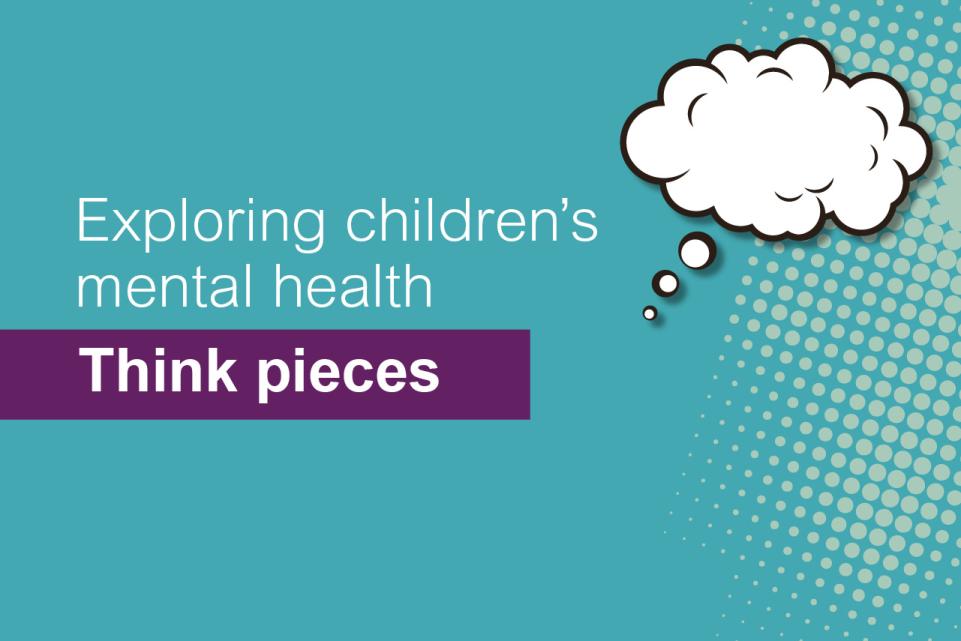Cllr Louise Gittins, Chair of the LGA's Children and Young people Board provides a written reflection and summary on the LGA's series of independent think pieces which explored children and young people's mental health.
The Local Government Association is delighted to have heard from so many talented and interesting contributors over the past three months on how we can change the system and improve the situation for children and young people’s mental health.
We hoped the conversation would bring new and different ways of looking at the challenges we face whilst providing opportunities for consensus across different partners, commentators and organisations. We have seen this, and more, including a challenge to system leaders and policy makers to make a change for children, young people and families. We heard that for many babies, children and young people, the system is not working with rising numbers of young people needing support from health services. However, we also heard a lot of good practice and areas that can be built on. I was struck by the core themes and similarities emerging from the think pieces, which are areas for all system leaders to consider as we move forward.
From our contributors from the NSPCC Board for Change we heard about the importance of engagement with young people who have accessed the system and know what works and what doesn’t. There were also frustrations about the difficulty in accessing mental health services and the need for young people to be better understood by all practitioners who work with them. Another contributor highlighted the importance of young people having the freedom to choose and influence their experiences with mental health services treatments and the need for services to provide that opportunity for them.
Education emerged as a common theme across many of the think pieces, reflecting how it can be both a protective factor and a negative impact on some young people impacting their mental health.
There was a suggestion that schools could become part of a culture of wellbeing, a new look at the curriculum could result in a more supportive environment, and interventions in schools could also make a significant improvement to children’s mental health, such as the expansion of mental health support teams.
There was agreement from authors on the importance of early intervention and prevention; stopping mental health needs from emerging and intervening when they first start to stop the need for long-term engagement with mental health services. Unfortunately, we heard this early support was sometimes challenging for young people to access. Support outside of the school environment is equally important for young people, for example in early support hubs, and for the youngest children through perinatal and infant mental health support.
Partnership and cross-system working underpin the success of services and the way to ensure young people can feel supported, receive timely and effective support and thrive. Although there are some challenges in the existing systems, all contributors from different backgrounds, be that local authority, education, NHS, or voluntary sector, highlighted how better joint working was one part of the solution for supporting holistic and person-centred care.
The importance of family networks and the environment that young people grow up in, such as the impact of financial pressures on them were also shared by some contributors as making clear the impact this has on mental health needs among young people. Seeing mental ill health as a systemic issue and ensuring access to some basic factors - including healthy food, good sleep, sufficient financial provision and technology - can help to improve the mental health of young people in society.
International colleagues are experiencing similar challenges to those we are seeing in England, with rising numbers of children and young people reporting concerns with poor mental health and a system under pressure to respond to these. They provided useful insights into what they are doing to tackle this. Such as, in Norway, ensuring that local areas have the flexibility to work on health promotion, rather than a clinical focus. In Austria, tackling the imbalance in access to diagnosis and therapies across regions and communities, and in the Netherlands, tackling the system around the young person instead of focusing solely on individual needs.
We also heard calls for addressing the children’s mental health challenge as a slow disaster which requires a trauma response, ensuring young people have access to good-quality work and affordable housing, valuing play among young people, the importance of leisure and cultural facilities and looking differently at how we prevent and treat eating disorders.
There is too much interesting insight to fully summarise here. As Chair of the Children and Young People Board at the LGA, I would like to thank contributors to our think piece series and encourage people to read and share their views. The Children and Young People Board is developing a task and finish group to look at the topic of children’s mental health, how we can do more in this space, support councils and continue to make clear asks of and offer support to central government. To finish, I will quote Lola, from the NSPCC Board for Change, who set out a clear challenge to us all:
“[the children’s mental health system] isn’t meeting the needs of us children and much more can be done to better support us”.
If you would like to share local practice or feedback on the challenges you are seeing please contact [email protected]


